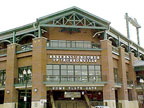
While much of the new ballpark's 10,000 seats are open-air seating, the park also features 12 suites and a suite-level club, both air conditioned for those warm Jacksonville afternoon and evening games. In addition to the cooling for the suites, 27 Loren Cook Company exhaust fans were employed to help keep the open-air spectator area cool on the hottest days and nights.
W.W. Gay Mechanical Contractors (Jacksonville, FL) was awarded the contract to ensure that fans watching the games from these special sections did so in comfort. To cool the administration area, the training and locker room, and the suite areas, W.W. Gay installed seven Carrier 39M Aero central station air handlers.
The ballpark's system was linked to Jacksonville's first central chilled water plant located in downtown, thus there's no need for a mechanical room or cooling towers and no concerns about noise or space restrictions tied to chillers. Five AHUs were placed at the lower level of the park on the service level, and one rooftop unit was installed to serve the suites. Each suite and the concession areas also received Carrier fancoil units.
Addressing Issues Faced ‘In The Field'
The contractor was particularly pleased with how well the Carrier units tackled issues that contractors often face in the field. It's unfortunately common, W.W. Gay's vice president and general superintendent Terry Shepard explained, for some HVAC equipment to get damaged in shipping or when stacked on the job site.According to Shepard, none of these problems were encountered with the Aero, whose galvanized, prepainted steel casings have a unique structural frame designed to not only carry their own weight, but also to enable easy and safe removal of all panels for servicing. Also, as a key safety feature, there are no exposed sheet metal edges anywhere on Aero's appliance-quality finish.
W.W. Gay superintendent Rick Knight said that in addition to economics, the AHUs were selected because of their dependability and the reliability of the vendors. "When it came time to assemble the Aero sections, we simply fastened them together using the factory-installed latches and hand tool. We didn't have to worry about squaring up ‘racked' units or the alignment and installation of countless bolts," Shepard said. "Our labor time was reduced substantially over conventional bolted designs."
According to Knight, local contractors also always face the possibility of oxidation problems due to the high humidity. White rust sometimes forms on galvanized surfaces when moisture gets in during shipment, outside storage, or during installation in exposed buildings. However, the unit was specifically designed to prevent leakage; each panel and section-to-section connection rests against tight, automotive-type seals. "All of the Aero unit's panels are galvanized, pre-painted steel both inside and out," Knight said. "We had no problems with white rust."
Pregame Warmup
Like most contractor projects, the new Jacksonville ballpark required that mechanical contractor, John J. Christy, have the A/C system operational prior to building occupancy to help dry out the building. However, Knight explained, in an unfinished building environment there is plenty of moisture and contaminants - from sanding, sweeping, and VOC emissions - that can get into an HVAC system, which can lead to potential future IAQ problems."The Aero units were so dry and clean, we had no problem using them to help dry out the rest of the ballpark building," Knight added. Throughout the inaugural season in the new stadium, the HVAC system preformed admirably. Nearly 360,000 fans turned out to see the Los Angeles Dodgers affiliate play last season and even when the Suns shone brightly, they were likely pretty comfortable. ES
